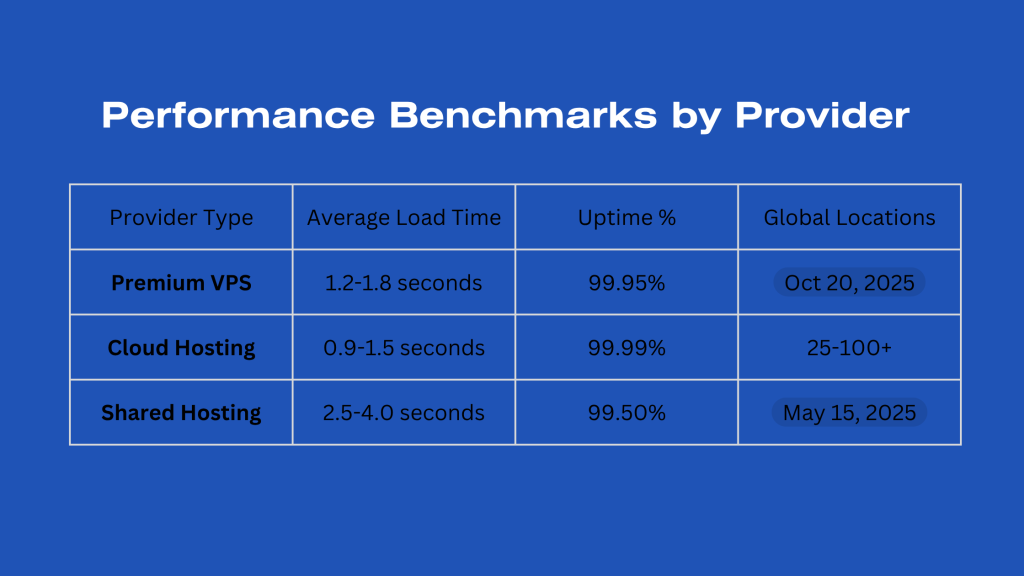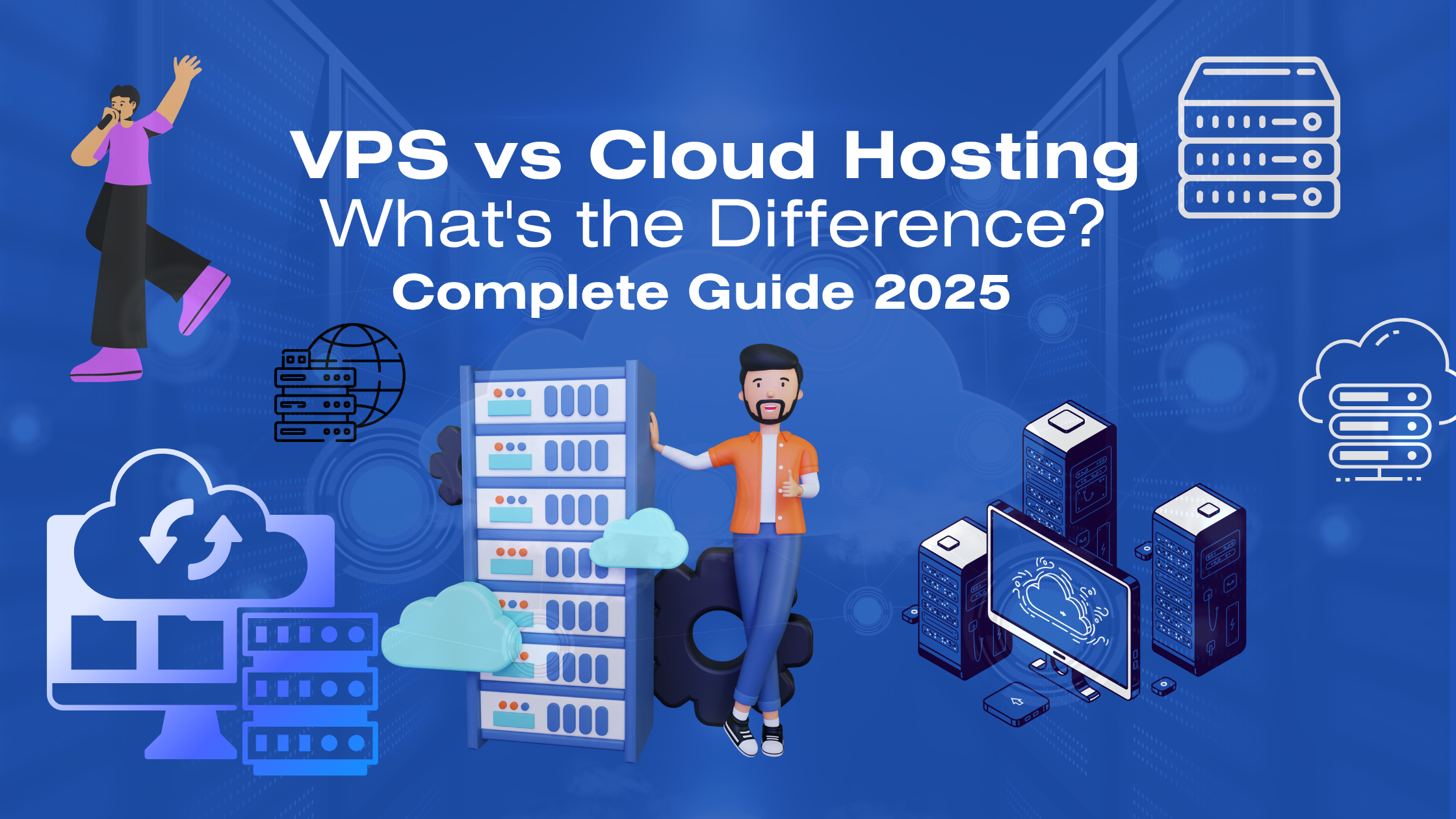When choosing the right hosting solution for your website or application, understanding the fundamental differences between VPS vs cloud hosting is crucial for making an informed decision. Both hosting types offer distinct advantages, but selecting the wrong option can impact your website’s performance, scalability, and costs.
What is VPS Hosting?
Virtual Private Server (VPS) hosting is a hosting solution that uses virtualization technology to divide a physical server into multiple virtual servers. Each VPS operates independently with dedicated resources including CPU, RAM, storage, and bandwidth. Think of VPS hosting as owning an apartment in a building – you have your own space and resources, but you’re still sharing the underlying infrastructure.
Key Features of VPS Hosting:
- Dedicated server resources
- Root access and full control
- Isolated hosting environment
- Predictable performance
- Fixed resource allocation
What is Cloud Hosting?
Cloud hosting utilizes a network of interconnected servers to host websites and applications. Instead of relying on a single physical server, cloud hosting distributes your data across multiple servers in different locations. This creates a robust, scalable infrastructure that can automatically adjust resources based on demand.
Key Features of Cloud Hosting:
- Scalable resources on-demand
- High availability and redundancy
- Pay-as-you-use pricing model
- Global server network
- Automatic load balancing
VPS vs Cloud Hosting: Detailed Comparison
Quick Comparison Table
| Feature | VPS Hosting | Cloud Hosting |
| Resource Allocation | Fixed, dedicated resources | Dynamic, scalable resources |
| Pricing Model | Fixed monthly cost ($20-200/month) | Pay-as-you-use ($10-500+/month) |
| Uptime Guarantee | 99.5-99.9% typical | 99.9-99.99% typical |
| Scalability | Manual scaling, potential downtime | Instant auto-scaling, zero downtime |
| Setup Time | 15-30 minutes | 1-5 minutes |
| Technical Expertise | High (server management required) | Low to Medium (managed options) |
| Best For | Consistent traffic, predictable costs | Variable traffic, high availability |
| Storage Type | SSD (typically 20GB-1TB) | SSD with unlimited potential |
| Backup Options | Manual or scheduled | Automated, multiple locations |
| Global Reach | Single data center location | Multiple global data centers |
Industry Statistics and Market Trends
The hosting industry has seen significant shifts in recent years, with compelling statistics highlighting the growing importance of both VPS and cloud hosting:
Cloud Hosting Growth:
- The global cloud hosting market is projected to reach $183.6 billion by 2025, growing at a CAGR of 18.3%
- 94% of enterprises now use cloud services in some capacity
- Cloud hosting reduces IT costs by an average of 15-20% for most businesses
- 99.99% uptime is achievable with major cloud providers, compared to 99.5% average for traditional hosting
VPS Hosting Market:
- VPS hosting market size reached $4.5 billion in 2024, with steady 7.2% annual growth
- 67% of small to medium businesses prefer VPS for its cost-predictability
- Average VPS performance improvement of 40-60% compared to shared hosting
- 85% of VPS users report better security compared to shared hosting solutions
Performance Benchmarks:
- Cloud hosting shows 23% faster load times on average during traffic spikes
- VPS hosting provides 15% more consistent response times under steady loads
- 78% of businesses experience improved website performance after migrating from shared to VPS hosting
- Cloud hosting can handle traffic spikes up to 1000% without performance degradation
1. Performance and Reliability
VPS Hosting Performance: VPS hosting offers consistent performance since you have dedicated resources that aren’t shared with other users. However, if the physical server experiences hardware failure, your website will go offline until the issue is resolved.
Cloud Hosting Performance: Cloud hosting provides superior reliability through redundancy. If one server fails, your website automatically switches to another server in the network, ensuring minimal downtime. The distributed nature of cloud infrastructure often results in better overall performance.
2. Scalability
VPS Scalability: Scaling VPS resources typically requires manual intervention and may involve temporary downtime. You’re limited by the physical server’s capacity, and upgrading often means migrating to a more powerful server.
Cloud Scalability: Cloud hosting excels in scalability, offering instant resource scaling without downtime. You can automatically scale up during traffic spikes and scale down during quiet periods, making it ideal for websites with fluctuating traffic.
Cost Analysis: VPS vs Cloud Hosting
Real-World Pricing Examples
VPS Hosting Costs (Monthly):
- Entry Level: $20-40/month (2GB RAM, 50GB SSD, 2TB bandwidth)
- Mid-Range: $50-100/month (4-8GB RAM, 100-200GB SSD, unlimited bandwidth)
- High-End: $150-300/month (16-32GB RAM, 500GB-1TB SSD, dedicated IP)
Cloud Hosting Costs (Variable):
- Small Website: $15-50/month (average usage)
- Medium Business: $100-500/month (with auto-scaling)
- Enterprise Level: $1,000-10,000+/month (high-traffic applications)
Cost Efficiency Statistics:
- Small websites save an average of 25-30% with VPS hosting over cloud hosting
- Growing businesses save 40-60% with cloud hosting due to pay-as-you-scale model
- Enterprise applications reduce infrastructure costs by 35-50% using cloud hosting
- VPS hosting provides 100% cost predictability vs 15-20% monthly variance in cloud hosting bills
VPS Hosting Costs: VPS hosting typically follows a fixed monthly pricing model. You pay for allocated resources whether you use them or not. This predictable pricing structure is beneficial for budget planning but may result in paying for unused resources.
Cloud Hosting Costs: Cloud hosting uses a pay-as-you-go pricing model. You only pay for the resources you actually consume, which can be more cost-effective for variable workloads. However, costs can be unpredictable during traffic surges.
4. Control and Customization
VPS Control: VPS hosting provides complete root access, allowing full server customization. You can install any software, configure server settings, and have complete control over your hosting environment.
Cloud Control: Cloud hosting may offer less granular control compared to VPS, depending on the provider. However, many cloud platforms now provide extensive customization options through management interfaces and APIs.
5. Security
VPS Security: VPS hosting offers good security through isolation from other users on the same physical server. You’re responsible for implementing and maintaining security measures, which provides control but requires technical expertise.
Cloud Security: Cloud hosting providers typically offer robust security features, including automated backups, DDoS protection, and security monitoring. The distributed nature of cloud infrastructure also provides natural protection against certain types of attacks.
When to Choose VPS Hosting
VPS hosting is ideal for:
- Businesses requiring consistent, predictable performance
- Applications needing specific server configurations
- Organizations with in-house technical expertise
- Websites with steady, predictable traffic
- Budget-conscious projects requiring dedicated resources
- E-commerce sites needing reliable performance
When to Choose Cloud Hosting
Cloud hosting is perfect for:
- Websites with variable or unpredictable traffic
- Applications requiring high availability
- Businesses prioritizing scalability
- Organizations wanting managed infrastructure
- Startups with limited technical resources
- Global applications needing worldwide reach
Popular VPS and Cloud Hosting Providers
Top VPS Hosting Providers with Statistics:
- DigitalOcean – 15.6% market share, 99.99% uptime, 14 global locations
- Linode – 8.2% market share, 99.95% uptime, enterprise-focused
- Vultr – 6.8% market share, 17 global locations, high-performance SSD
- Hostinger – 4.3% market share, budget-friendly, 99.9% uptime
- InMotion Hosting – 3.1% market share, excellent customer support
Leading Cloud Hosting Providers with Market Data:
- Amazon Web Services (AWS) – 33% cloud market share, 84 availability zones
- Google Cloud Platform – 8% market share, 27 regions worldwide
- Microsoft Azure – 21% market share, 60+ regions globally
- Cloudflare – Growing edge computing leader, 250+ cities
- DigitalOcean Droplets – Cloud VPS hybrid, developer-friendly
Migration and Adoption Statistics:
- 43% of companies migrated from shared hosting to VPS in 2024
- 61% of businesses are planning cloud migration within the next 2 years
- Average migration time: 2-4 hours for VPS, 1-6 weeks for complete cloud migration
- Success rate: 92% successful VPS migrations, 87% successful cloud migrations
Performance Benchmarks by Provider:

Provider TypeAverage Load TimeUptime %Global LocationsPremium VPS1.2-1.8 seconds99.95%10-20Cloud Hosting0.9-1.5 seconds99.99%25-100+Shared Hosting2.5-4.0 seconds99.5%5-15
Making the Right Choice: VPS or Cloud Hosting?
The decision between VPS hosting vs cloud hosting depends on your specific requirements:
Choose VPS hosting if:
- You need predictable costs and performance
- Your traffic patterns are consistent
- You require full server control
- You have technical expertise for server management
- Your budget is fixed and limited
Choose cloud hosting if:
- Your traffic varies significantly
- You prioritize high availability and redundancy
- You prefer managed infrastructure
- You need rapid scalability
- You want to pay only for resources used
Conclusion
Both VPS hosting and cloud hosting offer unique advantages for different use cases. VPS hosting provides dedicated resources, predictable costs, and full control, making it ideal for consistent workloads. Cloud hosting offers superior scalability, reliability, and flexibility, perfect for dynamic applications and growing businesses.
Consider your specific needs including budget, technical expertise, traffic patterns, and growth projections when making your decision. Many businesses start with VPS hosting and migrate to cloud hosting as they scale, while others begin with cloud hosting for its flexibility and managed services.
The hosting landscape continues to evolve, with many providers now offering hybrid solutions that combine the benefits of both VPS and cloud hosting. Evaluate your options carefully and choose the hosting solution that best aligns with your current needs and future goals.







